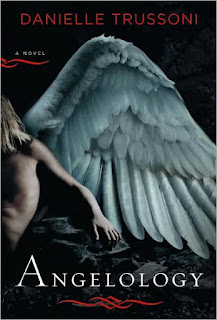Book Review: Angelology
Angelology
Danielle Trussoni
One thing that makes an alternative history good is that it can give you an especially unsettling jolt with the realization that, not only are things not as you think they are, they never were. You get this feeling a few times in Angelology, which sort of (but not exactly) does for angels what Interview with the Vampire did for vampires. You soon find out that the offspring of fallen angels and humans, the Nephilim, have been around since at least Old Testament times, passing themselves off as humans, and they’re not here to help. Their cousins, the fallen angels, may also exist here in physical form. On a line with Dan Brown books at one end and Umberto Eco’s The Name of the Rose at the other, Angelology is about halfway between the two, more literary than Brown’s novels but more accessible than Eco’s book.
It all starts with Sister Evangeline, a nun in upstate New York who is no one special particularly and who’d just as soon keep it that way. A researcher, a Mr. Valentine, contacts her and unwittingly ends her life of spiritual order and routine. He’s looking for certain documents that will also end up shattering the life he likes as well. This new reality (and para-reality) will force the two into the world of the angelologists, a secret, ancient, worldwide and ecumenical group that has one purpose: studying fallen angels and Nephilim and combatting them. (This is the only plot hole: how could bad angels, bad quasi-angels, and heroic angelologists remain secret for so long? Answer: skip over this and enjoy the book).
There’s plenty to happily chew on here: the not-so-usual hidden texts, and new slants on the Book of Enoch, the myth of Orpheus and the Bible. And, of course, dust-laden secret passageways, code words, and conspiracy theories (all freshened up). Trussoni ties it all together well, and the plot pretty much always hums right along. There is one thematic thing that’s not so smooth. That’s the fact that, as you learn about the Nephilim, you begin to realize that they are stand-ins for some of the most unvirtuous aspects of humanity, some of which we tend to frame as accepted, and acceptable, behavior. That’s more unsettling than anything a vampire’s capable of.
Richard Grooms
Fiction Department
Central Library
Danielle Trussoni
One thing that makes an alternative history good is that it can give you an especially unsettling jolt with the realization that, not only are things not as you think they are, they never were. You get this feeling a few times in Angelology, which sort of (but not exactly) does for angels what Interview with the Vampire did for vampires. You soon find out that the offspring of fallen angels and humans, the Nephilim, have been around since at least Old Testament times, passing themselves off as humans, and they’re not here to help. Their cousins, the fallen angels, may also exist here in physical form. On a line with Dan Brown books at one end and Umberto Eco’s The Name of the Rose at the other, Angelology is about halfway between the two, more literary than Brown’s novels but more accessible than Eco’s book.
It all starts with Sister Evangeline, a nun in upstate New York who is no one special particularly and who’d just as soon keep it that way. A researcher, a Mr. Valentine, contacts her and unwittingly ends her life of spiritual order and routine. He’s looking for certain documents that will also end up shattering the life he likes as well. This new reality (and para-reality) will force the two into the world of the angelologists, a secret, ancient, worldwide and ecumenical group that has one purpose: studying fallen angels and Nephilim and combatting them. (This is the only plot hole: how could bad angels, bad quasi-angels, and heroic angelologists remain secret for so long? Answer: skip over this and enjoy the book).
There’s plenty to happily chew on here: the not-so-usual hidden texts, and new slants on the Book of Enoch, the myth of Orpheus and the Bible. And, of course, dust-laden secret passageways, code words, and conspiracy theories (all freshened up). Trussoni ties it all together well, and the plot pretty much always hums right along. There is one thematic thing that’s not so smooth. That’s the fact that, as you learn about the Nephilim, you begin to realize that they are stand-ins for some of the most unvirtuous aspects of humanity, some of which we tend to frame as accepted, and acceptable, behavior. That’s more unsettling than anything a vampire’s capable of.
Richard Grooms
Fiction Department
Central Library

Comments